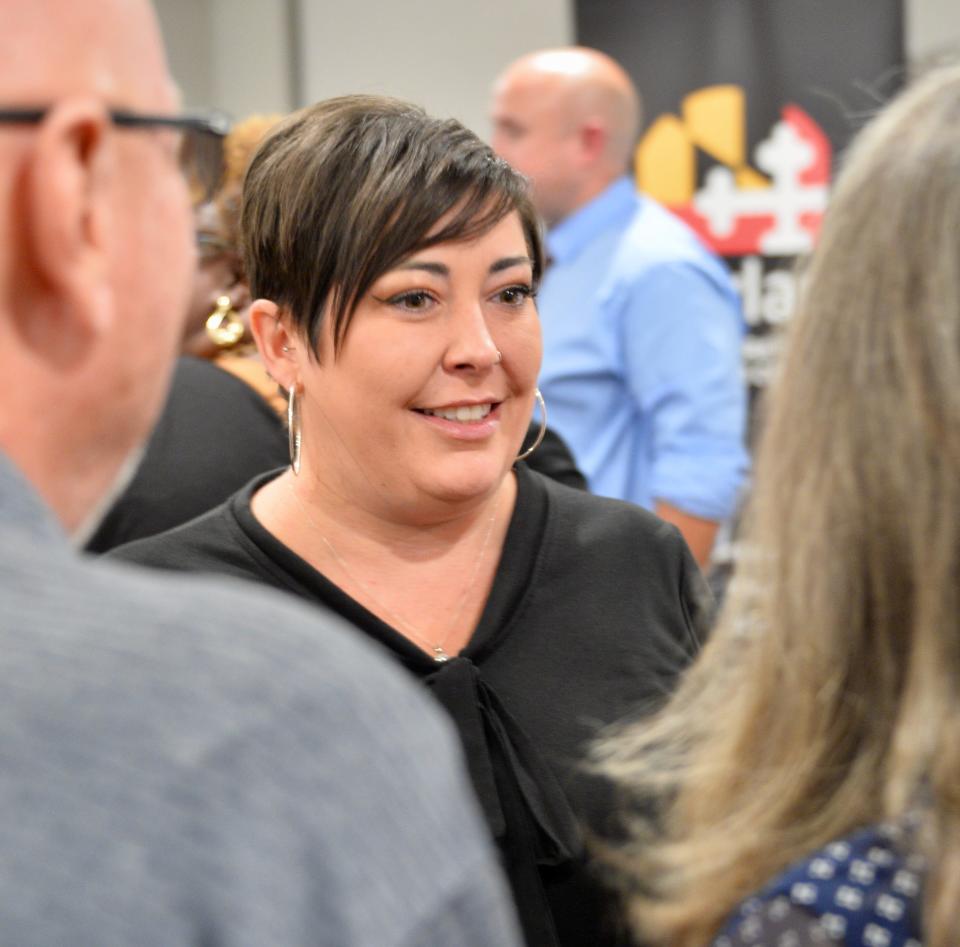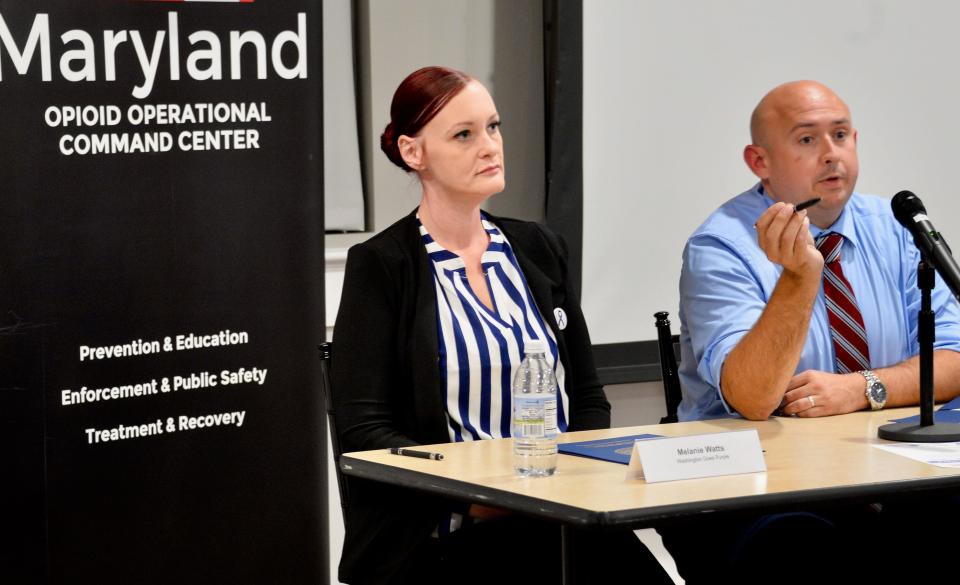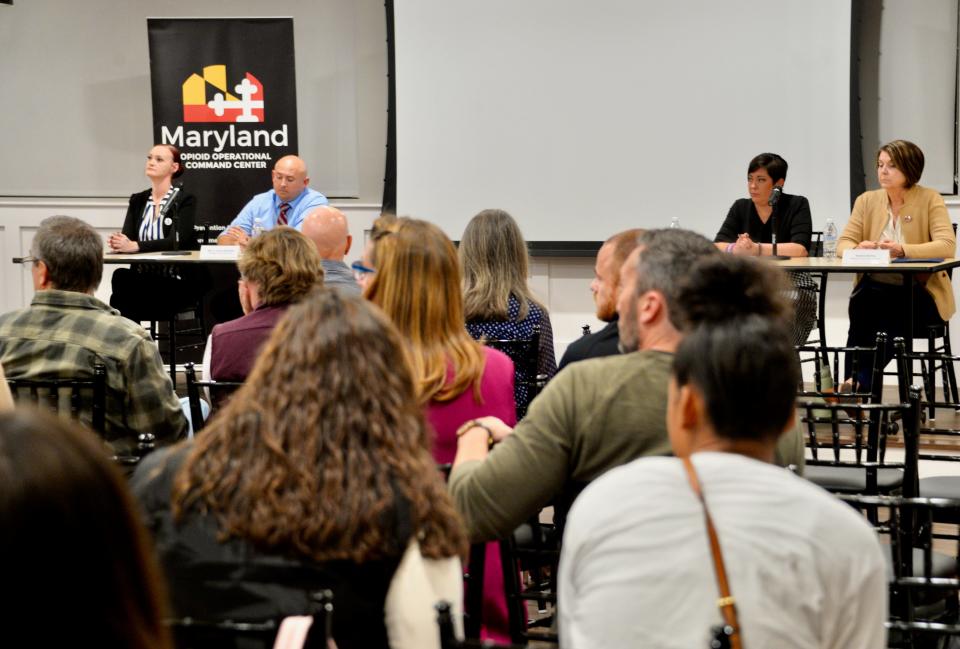Overdose crisis town hall in Hagerstown hears feedback, provides updates
Updates on local efforts to prevent substance use and news about the latest drug trends were shared Wednesday night at a town hall meeting in downtown Hagerstown about the overdose crisis.
The Maryland Opioid Operational Command Center, in partnership with the Washington County Health Department and the University System of Maryland at Hagerstown, hosted a Community Overdose Action Town Hall meeting Wednesday night at the university's downtown hospitality center to hear about the community's needs and get feedback to address opioid-related issues across the state.
Emily Keller, the state's special secretary of opioid response and a former Hagerstown mayor, was among the presenters.
Keller said this was the 11th town hall in a series that will hold meetings in all 23 counties and Baltimore City.
She said her office is coordinating the state's strategic plan to combat the opioid crisis. Though later she said she is trying "to change our language" away from the word opioids to treat it more as an overdose crisis.

Seven Marylanders are dying a day in the crisis, Keller said.
Keller said she knows those who work in the substance use field are feeling frustrated, seeing their communities hurting and people losing loved ones.
"I promise you there is so much good work being done. ... We are all in this together and we are going to get through this," Keller said. "It's going to take a strategic plan, but I promise you we are going to get there."
Through opioid lawsuit money coming in, Maryland will have close to $500 million over the next 18 years, Keller said.
"That’s a ton of money. And it can be a game changer if we are thoughtful in how we dispense those funds and what we’re using them for and what we’re focused on," Keller said. "I think we’re going to see a huge tide turning with the substance use crisis."
With the help of Antietam Broadband, the town hall was live streamed and can be watched at https://www.youtube.com/watch?v=DEmbK2WslXs.
Feedback from audience
About 50 people attended the meeting. Several people spoke about services and support their organizations are providing.
Some people had questions about what resources are available.
One woman said there is a need for in-patient treatment centers for single fathers and that she dreams about opening a treatment facility for families.
Vicki Sterling, director of behavioral health for the Washington County Health Department, said after the meeting that while there are programs in the state to help women with children, the local health department ended its program, Cameo House, in 2021 due to lack of funds to safely staff the program.
There are also fathers who need treatment and have custody of their children and couples who need treatment, but have children, Sterling said.
It would be nice for the community to have a program that treats the family together, Sterling said.
There's a need to look at how services are provided and to do away with the old ways, Sterling told attendees.
There is no one-size-fits-all approach, she said.

Melanie Watts, "a person in recovery" who co-chairs Washington Goes Purple with Sterling, said there are people falling through the cracks because treatment officials think someone else is following up on the client, so no one follows up.
"The most important thing is connection," she said. If a substance user has three contacts for treatment, all three should be following up.
"Who cares if the phone is blowing up? At least that person knows they are being cared for," she said.
Illegal drug trends
One reason Keller said she wants to shift to framing the issue as an overdose crisis and not just an opioids crisis is that there has been a significant increase in cocaine deaths with fentanyl in them, Keller said.
Addressing an attendee who asked about possible legislation regarding the rise of the horse tranquilizer xylazine, known on the street as tranq, Keller said a work group has been assembled to look at the best ways to combat it.
Keller said she talked to the state's agriculture secretary and state veterinarian about it because a large component will be educating veterinarians and farmers who deal with large animals.
Officials don't know if it's being illicitly manufactured, but Keller said after the meeting that officials started seeing tranq in the illicit drug supply in Maryland during the last two years.

Xylazine causes wounds that can go all the way to a person's bones, she told attendees. The wounds could be anywhere on the body, not just injection sites, and can be so severe that amputation is required, Keller said.
Naloxone does not reverse the effects of xylazine, according to the Drug Enforcement Administration and the Centers for Disease Control and Prevention.
Keller said there isn't science on xylazine when it comes to humans because it's never been studied in humans.
People don't want to use drugs containing xylazine, but they don't know if it's in their drug supply, Keller said.
Keller noted the importance of the state's Rapid Analysis of Drugs (RAD), which tests samples from drug users participating in syringe services across the state. The syringe participants voluntarily, anonymously provide a sample from their drug supply and are asked what they think they are using.
Less than 2% of tests are positive for heroin, Keller said after the meeting. "It's all fentanyl now" or tranq, she said.
Update on what's being done about overdose epidemic in Washington County
Near the start of the meeting, Sterling read a long list of things that have and are being done in regards to prevention and helping substance users.
That included that Meritus Health's crisis stabilization bed program for substance abuse users recently moved into its own unit at Meritus Medical Center, so patients can go straight there rather than go through the Emergency Department. Previously, the six beds were in the mental health unit, Sterling said.
Other updates Sterling provided included:
The Too Good for Drugs curriculum for middle and high school-aged youths is being provided at Girls Inc. and at Horizon Goodwill's Adolescent Clubhouse program.
Health officials met with Washington County Public Schools to provide complimentary curriculum so students from elementary to high school are getting the same evidence-based message about substance use as well as social skills, decision making and dealing with their emotions.
From July 2022 to June 2023, 10,432 Narcan doses were handed out. Naloxone, also known by the brand name Narcan, is used to block or reverse the effects of opioids.
During that time period, county health officials responded to 984 overdose reports and have responded to 400 since July this year. Those could be overdoses from a variety of substances, including insulin, aspirin or illegal drugs. Officials call or go to the person who overdosed to educate them about available resources, including naloxone, lockboxes for drugs, peer support and treatment options if the person is ready for that.
County health officials did "lunch tables" at WCPS's middle and high schools last school year, interacting with 3,000 youths. This included youths signing pledges to be drug free and getting information about topics such as vaping and marijuana. Officials will visit those schools again this school year.
Sterling told attendees that, "We have got to start paying attention to our youth."
There need to be conversations with adolescents to let them know "it's not OK to experiment," Sterling said. "We get a lot of, 'Well, it was just a vape,' but you don't know what was in that vape," Sterling said.
Youth who uses substances are more likely to become dependent later in life, she said.
Transportation priorities: State and local officials talk safety as funds discussed for I-81 project completion
This article originally appeared on The Herald-Mail: Maryland overdose crisis town hall series comes to Washington County

